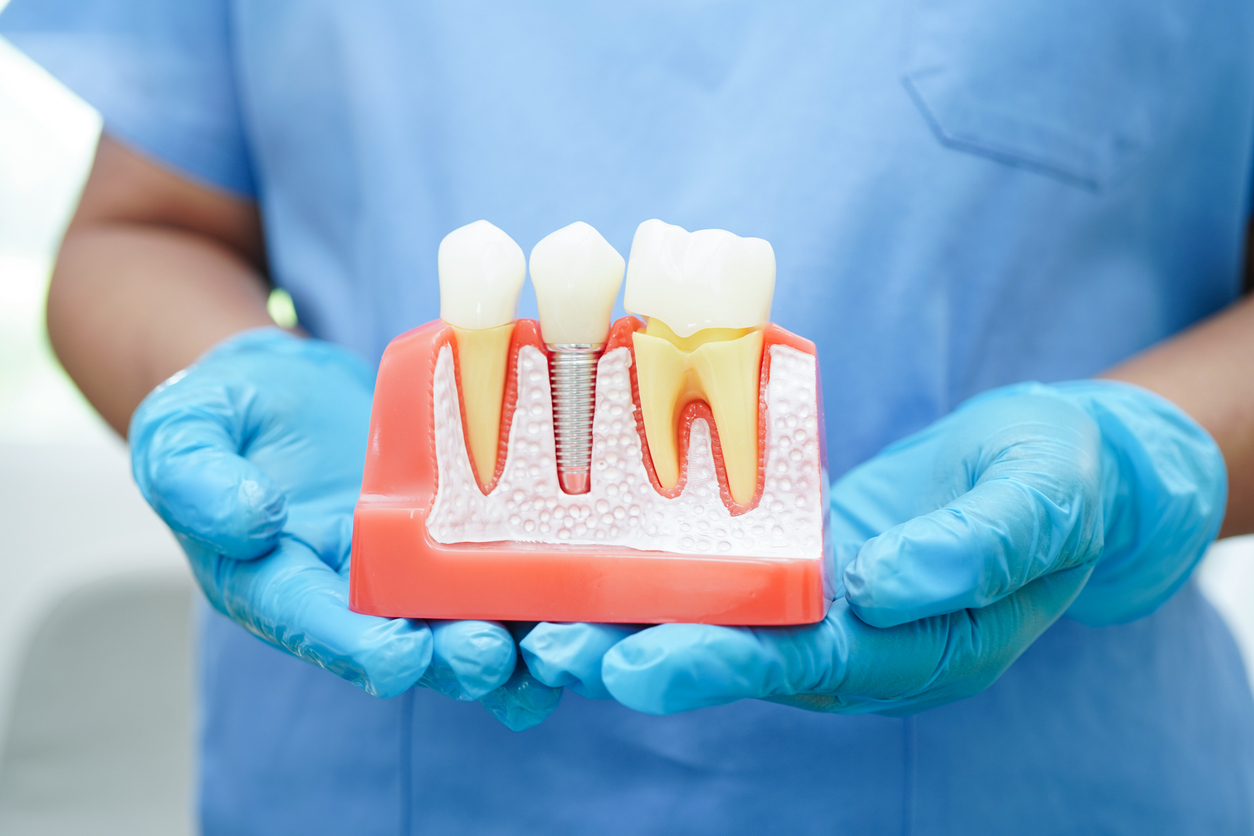The procedure of getting dental implants is dental surgery. Metal posts are inserted in the jawbone to represent the roots of natural teeth and fuse with it over time. Then, dental crowns are attached to the implants. Still, the type of dental implants and the procedure depend on a patient’s dental needs and oral health. Please read our article to learn more about the different types of dental implants.
The Different Types of Dental Implants
Depending on the number of teeth you are missing, you can get a single implant, multiple implants, or full-mouth implants (if none of the natural teeth are present). We discuss several main classifications of dental implants below.
Endosteal Implants
Endosteal implants are the most common type, usually made of titanium, and can support one or more prosthetic teeth. This type of implant looks like a small screw and is surgically placed directly into the jaw bone to represent the root of a tooth. During the surgery, one part of the implant remains on the surface of the gum to hold the dental crown. The healing time after the procedure might take several months as the jaw bone has to fuse with the implant to provide secure support for the crown.
You can get endosteal implants, provided that your jaw bone has enough density to support them. Also, endosteal implants require good oral health, healthy gums, and good general health that will allow the body to heal sufficiently after the implant placement.
Subperiosteal Implants
Subperiosteal implants can be recommended if a patient does not have enough jaw bone density to support the endosteal implants. The implants are placed under the gum line, on or slightly above the jaw bone. Similar to endosteal implants, one end of subperiosteal implants protrudes through the gum to hold the dental crown.
Mini Dental Implants (MDIs)
A mini dental implant is also surgically implanted in the jaw bone, but it is smaller in diameter than a traditional implant—typically less than 3.5 mm. MDI placement is considered a less invasive procedure compared to traditional implant surgery. Mini dental implants can often be used to support a lower denture. In some cases, they are recommended to patients who have lost some of the density of their jaw bone. However, MDIs are used less frequently than traditional implants.
Same-day Implants
Same-day implants are also called immediate-load dental implants. They can be placed together with the dental crowns during the same appointment. This type of implant can be chosen if a patient has enough jaw bone density to support the implant without the risk of failure.
All-on-4 Implants
All-on-4 implants are a good option for patients who are missing an entire arch of teeth. In this case, four implants are placed in the jaw bone, and later, once they securely fuse with the bone, an entire arch of prosthetic teeth will be attached to them.
Procedures That Might Accompany Dental Implant Placement
In cases when a patient’s oral health does not allow immediate placement of dental implants, a dentist might recommend several additional procedures that can help prepare the jaw bone for receiving the implants.
Bone Grafting
Bone grafting is a surgical procedure. It prompts the regeneration of a jaw bone and restores its density. It involves placing grats in several places in the bone. The graft can be made of natural or artificial materials.
Sinus Lift
A sinus lift is recommended when the upper back part of the jaw does not have enough room for dental implants due to the sinus pockets taking up the space. This condition can be fixed by raising the sinuses, often in combination with graft placement.
Ridge Expansion
Ridge expansion can help if the jaw is too narrow to receive and sufficiently support the implants. During the procedure, the bone grafts are placed in a space along the ridge, which is the top part of the jaw. In addition, ridge modification can prepare the bone for dental implants if it has deformities.
Learn More About Dental Implants
If you are considering getting dental implants, do not hesitate to call Absolute Family Dentistry today. Sign up for a consultation about dental implants in Norco. Our dental implant specialists will carefully examine the condition of your jaw bone and your oral and general health to determine if you are a good candidate for the surgery. We can also recommend several additional procedures to prepare you for successful implant placement and offer the most suitable implant option for you.
We look forward to welcoming you to our dental office.


